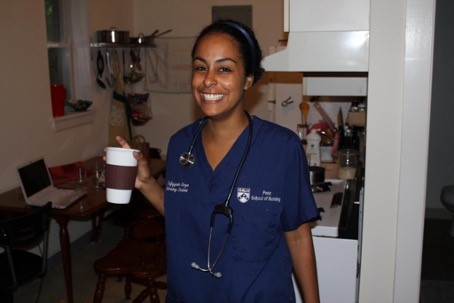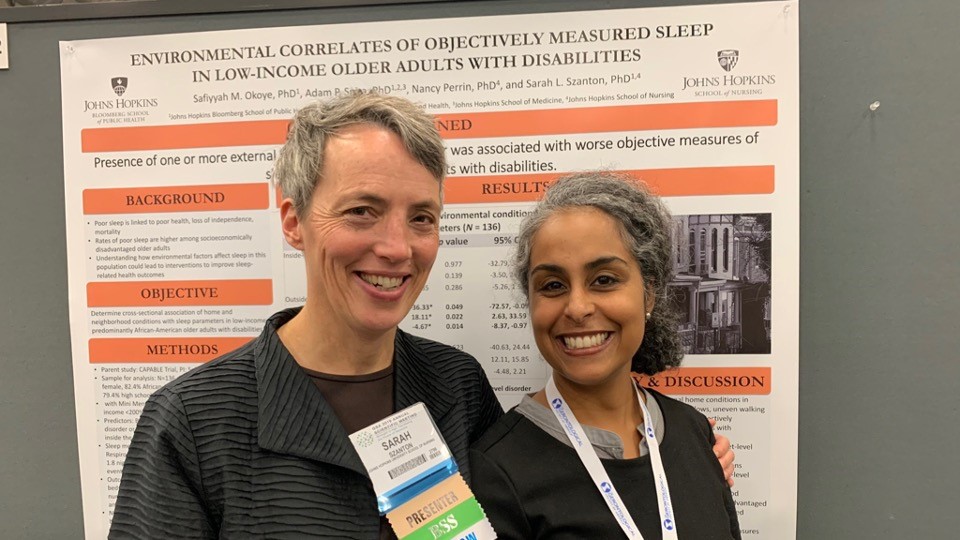FIRST Faculty's Path to Nursing
September 26, 2023
Although the path to achieving health equity is long, it’s being paved by people like Safiyyah M. Okoye, PhD, a Drexel FIRST (Faculty Institutional Recruitment for Sustainable Transformation) faculty member. Okoye, also an assistant professor in the Department of Graduate Nursing, nurse practitioner and public health researcher, hopes to transform health care in the United States by helping older adults achieve better health outcomes and informing the interventions that can help increase health equity.
Ahead, Okoye shares more about her career journey and how she hopes to make the most of her time as a FIRST faculty member.
What inspired you to become a primary care nurse practitioner?
 I went to Barnard College in New York City but grew up in Tucson, Arizona. And I had an aunt who was an architect in New York City. I was a history major because I wanted to learn about people. I liked writing and making arguments, so I thought I was going to be a lawyer after college. I became a paralegal for a few years and tried applying to a law school but never got past the test-prep book. After a while of working in the legal field, I did some reflection at an ashram outside of New York City and had this vision of myself helping people and offering advice — I saw myself working in health. Still, I wasn’t clear on what the job would be.
I went to Barnard College in New York City but grew up in Tucson, Arizona. And I had an aunt who was an architect in New York City. I was a history major because I wanted to learn about people. I liked writing and making arguments, so I thought I was going to be a lawyer after college. I became a paralegal for a few years and tried applying to a law school but never got past the test-prep book. After a while of working in the legal field, I did some reflection at an ashram outside of New York City and had this vision of myself helping people and offering advice — I saw myself working in health. Still, I wasn’t clear on what the job would be.
I had never really wanted to be a medical doctor. There are many chronic diseases in my family, and it always seemed like medical doctors never really addressed their issues. And so there was a lot of distrust.
I started looking at alternative medicine thinking I might be an acupuncturist or a naturopath. I discovered I hadn’t taken the prerequisites for naturopathic medical school. While working at a café and taking biology and anatomy courses in North Carolina, I talked to this naturopath who had gone to Barnard. She explained that she was having a hard time because you have to start your own business, and some states limit your practice rights. She told me, “Well, you know, being a nurse practitioner comes with a holistic philosophy; you can practice in any state and still serve people who don’t have much money because you can bill insurance.”
Treating the whole person appealed to me, and becoming a nurse practitioner would take less time than completing medical school.
I decided to go to the University of Pennsylvania for my nursing degree and chose to specialize in primary care — I didn’t focus on a specific age group or gender. I wanted to help everyone, and I wanted to help people who didn’t have much money.
Why did you become a researcher, and how does being a nurse practitioner impact that? Why did you choose to focus your research on older adults?
I realized our health care system is not set up to give people what they need. People can have Medicaid or go to a clinic. Still, there are so many larger social things influencing what [resources] people can and cannot access.
While working as a nurse practitioner (NP) in a federally qualified health center, I thought: How can I change health care? What could I do in this country that’s bigger than just me at the health center? And I remembered from my nursing school days that the people who seemed to have influence — a seat at the table — had PhDs. It was always in the back of my head that I wanted to get a PhD just because I liked being a student. I decided to actually apply for another job and left the health center after about two and a half years. Less than a year into the new NP job, I committed to the PhD and applied for programs.
I was interested in [studying] everybody and everything. Still, in school, I was told to focus on a tiny thing and a [specific] population.
 I went to Johns Hopkins University for my PhD. My mentor, Sarah Szanton, PhD, was a gerontologist, a nurse who had been a primary care nurse practitioner and studied older adults. She convinced me of the merits of studying this population. Gerontology is a multi-disciplinary and broad field that cares about social determinants of health and people’s social lives.
I went to Johns Hopkins University for my PhD. My mentor, Sarah Szanton, PhD, was a gerontologist, a nurse who had been a primary care nurse practitioner and studied older adults. She convinced me of the merits of studying this population. Gerontology is a multi-disciplinary and broad field that cares about social determinants of health and people’s social lives.
There’s a lot of public interest in the health of older adults and relatively more money to create innovative approaches to health care [for this population] because there’s public funding of Medicare and other programs for older adults. So, that’s what got me into gerontology.
Why did you become a FIRST faculty program member? What do you hope to get out of it?
The FIRST faculty program offers excellent resources — I have three years of protected research time and a good amount of startup funding to get my research going.
There’s also a great community of scholars — other FIRST members at the College of Nursing and Health Professions and the Dornsife School of Public Health. These researchers study my areas of interest like aging, social determinants of health and health equity.
We’re also set up with mentors and receive support in navigating academia and developing our research.
I hope being a part of FIRST helps me achieve my academic and professional goals. I want to achieve tenure and carve out an area of research that’s mine and generate knowledge that helps to advance health equity and the health experiences of Americans.
Written by: Tiffany Curtis